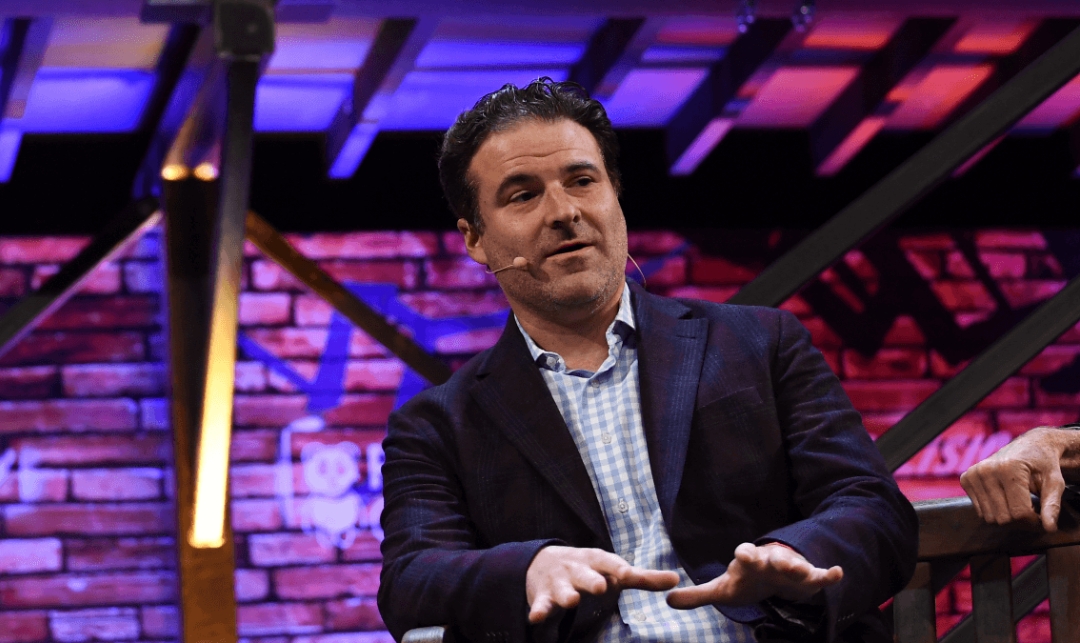There’s an old adage that says not to mix business with pleasure.
This is not a motto Darren Rovell subscribes to. Rovell, a sports business journalist, is an experienced reporter who is fully immersed in the world of sports betting and memorabilia collection—both as the subjects of his articles and as a personal passion.
Rovell is a senior executive producer at The Action Network, the market leader and trusted source for sports fans to enhance their betting and entertainment experience through quality reporting of news, betting tools, data, and odds. He’s made a name for himself as a reporter covering all sides of the sports betting industry.
“Darren’s largely responsible for taking the business of sports into the mainstream and we want him to do the same for sports betting,” Action Network CEO Patrick Keane said at the time of Rovell’s move to the company.

Rovell reporting for CNBC
Rovell got his start in the sports world in college at Northwestern University, where he studied communications and covered sports for both the weekly newspaper and the student-run radio station. When he graduated in 2000, he was hired by ESPN. This was the same year he started writing about and participating in sports betting.
After six years at ESPN, Rovell moved to CNBC as its sports business reporter. During his years there, he played basketball against Dwyane Wade, took a full-speed Andy Roddick serve straight to the chest, and crashed into a wall at the Charlotte Motor Speedway with Kurt Busch at the wheel. And with the advent of Twitter during his time at CNBC, Rovell gained a substantial following, cementing himself as a sports business expert.
It was this Twitter following—now numbered at 2 million—that helped land him his job at The Action Network. On Twitter, Rovell discusses gambling, projections, and other sports business news.
“They’re buying me as a brand,” Rovell said at the time of his transfer to The Action Network. “They’re buying a brand with 2 million Twitter followers. And I’ll be tweeting links to promote everything—the website, the app, and my stories.”
As both a journalist and a hobbyist, Rovell likes to be up to date on what’s going on in the industry. This is what brought him to Mint Collective, a sports collectibles tradeshow, where he spoke with CSQ. He said he has a “fiduciary responsibility” to come to the show and see what people were talking about.
Among the topics of interest? Ticket souvenirs and collectible photographs.

Darren Rovell with items from his collection of sports memorabilia
When a spectator purchases a ticket to see a sporting event, that small piece of paper can become a sentimental souvenir to commemorate the day. Rovell says this makes them more interesting pieces of memorabilia, as opposed to trading cards, for example, which are less personal.
“Most pictures on cards are not attached to anything. It’s just a random day,” Rovell said. “But I think tickets tie to moments. You could say ‘I knew where I was when.’ And I like to invest in things that people have reactions to.”
Rovell said as he began to show the tickets he’s saved over the years to more and more people, it contributed to his work by enhancing his storytelling capabilities.
In addition to sporting event tickets, Rovell has also invested in sports photography memorabilia, which is classified by types one through four. Type one photos are the most valuable because they are considered first generation, meaning they were developed from the original negative within two years of when the picture was taken. Type two photos are the second-most desirable, since they were also developed from the original negative but more than two years from when the photo was taken. Types three and four are considered second generation, and are usually developed from existing prints or wire transmission.
Rovell said he thinks type one photos are “amazing” but there is a disconnect between what the market thinks is valuable and what consumers appreciate.
“You can get things that seem to be relevant, that seem to be a great photo, for $100. And on the other side, this is a million dollars,” Rovell said. “There are many types of type one photos. I don’t think the market knows that yet.”
The influence and importance of the market in determining value is something Rovell advises newcomers to this space to be aware of. Buying and selling sports memorabilia is not a solo activity; it requires knowledge of who else is buying and selling similar products.
“You should know who owns the class of cards you’re in. People always forget about that,” Rovell said. “Why do you have to know that? Because you have to know what their net worth is, their capacity to hold. If those people are going to bend, that’s going to affect your price. So you have to know who you’re up against and who’s collecting with you.”














































